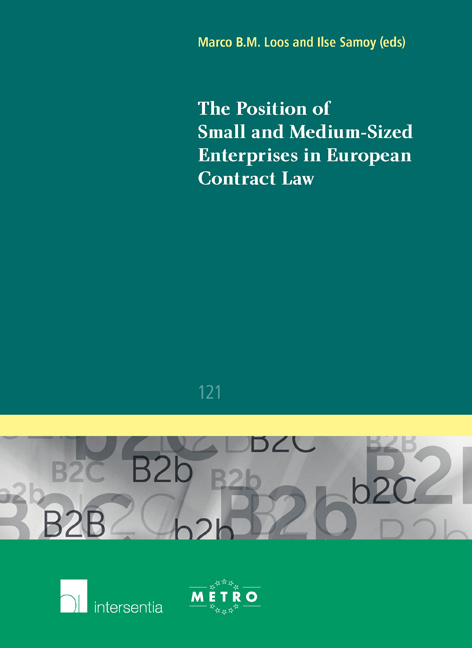Book contents
- Frontmatter
- Contents
- The Position of Small and Medium-Sized Enterprises in European Contract Law: An Introduction
- Chapter 1 SMEs in the Common European Sales Law
- Chapter 2 Can the Common European Sales Law do without the definition of an SME?
- Chapter 3 A Consumer Law for Professionals: Radical Innovation or Consolidation of National Practices?
- Chapter 4 The CESL and its Unfair Terms Protection for SMEs
- Chapter 5 Unfair Terms in Contracts Between Businesses A Comparative Overview in Light of the Common European Sales Law
- Chapter 6 Harmonisation of Rules on Business-to-Business Marketing Practices: A Critical Analysis of the MCAD Report
- Ius Commune Europaeum
Chapter 3 - A Consumer Law for Professionals: Radical Innovation or Consolidation of National Practices?
Published online by Cambridge University Press: 27 November 2017
- Frontmatter
- Contents
- The Position of Small and Medium-Sized Enterprises in European Contract Law: An Introduction
- Chapter 1 SMEs in the Common European Sales Law
- Chapter 2 Can the Common European Sales Law do without the definition of an SME?
- Chapter 3 A Consumer Law for Professionals: Radical Innovation or Consolidation of National Practices?
- Chapter 4 The CESL and its Unfair Terms Protection for SMEs
- Chapter 5 Unfair Terms in Contracts Between Businesses A Comparative Overview in Light of the Common European Sales Law
- Chapter 6 Harmonisation of Rules on Business-to-Business Marketing Practices: A Critical Analysis of the MCAD Report
- Ius Commune Europaeum
Summary
Le droit des contrats contemporain incorpore désormais de manière systématique le facteur d'inégalité et le souci de protection.'
1. P.CESL: realizing the internal market. In October 2011 the European Commission published its ‘Proposal for a Regulation of the European Parliament and of the Council on a Common European Sales Law’ (hereinafter P.CESL). The aim of the Proposal is to create an optional contract law regime or 28th contract law system which the parties to a sales contract can opt for to apply to their contract instead of their national contract law system. Contrary to earlier initiatives taken by the Commission in the area of contract law, a limited number of specific rules that are to regulate commercial relationships in which one or more small and medium-sized enterprises (hereinafter SME) is involved, were incorporated in the P.CESL, alongside a more extensive body of rules which reflect the general law of obligations. These rules are inspired by and to a large extent copied from the Draft Common Frame of Reference (hereinafter DCFR). Underlying their insertion in the P.CESL is the belief that the existence of 27 different national sales regimes, and the transaction costs resulting from dealings with these various national laws, deters SMEs vested in one Member State from offering their goods and related services in another Member State.
2. P.CESL: protecting weaker companies? It is believed by some that the Commission is hereby creating some kind of ‘consumer law for professionals’, meaning that the Commission is attempting to protect SMEs contracting with large enterprises (hereinafter LEs) or with other, more powerful, SMEs. This seems surprising. The number of rules which are specifically applicable to B2B contracts is limited, far more limited than is the case of B2C contracts. Also, the Preamble to the P.CESL clearly states that its SME rules mainly aim at preserving demand in the internal market. Contractual protection of SMEs against other companies is not mentioned as an express aim of the proposal. It goes without saying that the mere establishment of the internal market does not suffice to protect the weaker party in a contractual relationship.
- Type
- Chapter
- Information
- Publisher: IntersentiaPrint publication year: 2014



